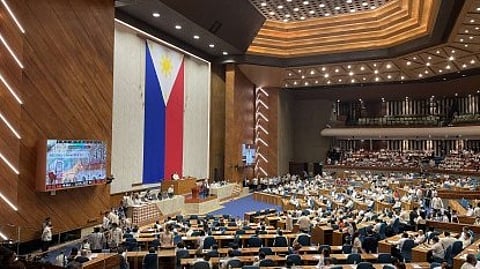
- NEWS
- the EDIT
- COMMENTARY
- BUSINESS
- LIFE
- SHOW
- ACTION
- GLOBAL GOALS
- SNAPS
- DYARYO TIRADA
- MORE

Members of the House of Representatives have renewed their call for the Senate to pass the stalled bill amending the allegedly restrictive economic provisions of the 1987 Constitution.
In a statement on Sunday, the so-called House “Young Guns” urged the Senate to “unlock the nation’s full potential” by passing its version of the economic Charter change (cha-cha) bill, Resolution of Both Houses (RBH) 6.
Assistant Minority Leader Ramon “Rodge” Gutierrez maintained that enticing foreign direct investment by relaxing the foreign ownership restrictions of the 37-year-old Constitution could “generate more jobs for Filipinos.”
House Assistant Majority Leader Jefferson Khonghun, on the other hand, emphasized that easing such restrictions would make the Philippines more attractive and competitive with advanced countries like those in ASEAN.
“In this era of fast global digitalization, the Philippines needs to level up... We are sorely lacking infrastructure, which is why our Asian neighbors left us behind,” said Khonghun, chair of the House Committee on Bases Conversion.
“Don’t we need to catch up? Can we not entertain change at all? Can we not try something new? Status quo is the last thing we need. We have to wake up from our long slumber, so to speak,” added House Assistant Majority Leader Zia Alonto Adiong, chairperson of the House Ad Hoc Committee on Marawi Rehabilitation and Victims Compensation.
In March, the House passed RBH 7 on final reading, which aims to ease foreign ownership restrictions in public utilities, higher education, and advertising by amending Articles 12, 14, and 16 of the Constitution. These restrictions are believed to be hampering the Philippines’ economic potential.
The House-approved measure mirrors the Senate’s RBH 6, which has yet to be approved at the committee level and is at a crossroads following the resignation of Sen. Sonny Angara, chairperson of the Senate subcommittee on constitutional amendments and revision of codes.
In late May, newly elected Senate President Francis “Chiz” Escudero, a known critic of cha-cha, disclosed plans to hold talks with Speaker Martin Romualdez to reconcile their diverging stances on the issue.
Despite initiating discussions, Escudero remained firm in his opposition to cha-cha. He argued that amending the economic provisions of the Charter would not have an “earth-changing” impact on the country’s economy, contrasting with the House members’ conviction.
Citing a recent survey, House Assistant Majority Leader Angelo Bongalon said the Philippines needs economic adjustments to keep pace with global economic demands.
“Opening specific economic provisions can create a more dynamic and resilient economy facing future challenges. The proposal will help attract more foreign direct investments crucial for the Philippines’ financial expansion and infrastructure development,” Bongalon said.
The survey reported that six to seven out of 10 respondents perceive the advantages of the constitutional amendment to economic provisions, including the creation of more jobs (72 percent), higher economic growth (68 percent), increase in salaries and work benefits (67 percent), and decrease in the prices of goods and services (63 percent).
However, 27 percent of respondents expressed concerns about a potential worsening of corruption, while another 23 percent feared an increase in foreign competitors for local businesses.
